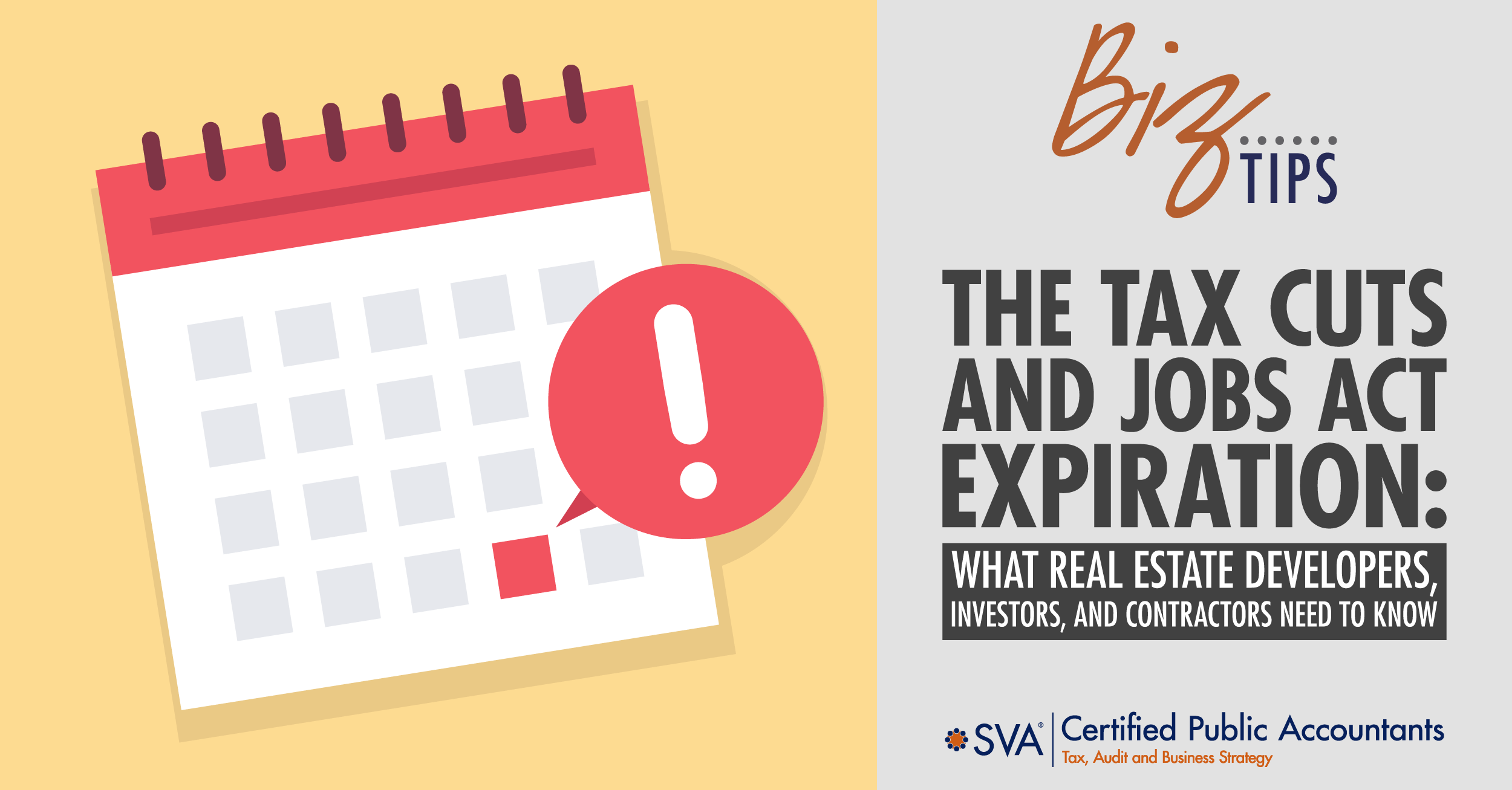| Highlights: |
- The Tax Cuts and Jobs Act (TCJA) provisions are scheduled to sunset at the end of 2025, prompting significant tax-planning considerations for developers, investors, and contractors prior to 2026.
- Key changes include reversion of lower individual tax rates, loss of the 20% Qualified Business Income deduction, phasing out of bonus depreciation, and reduction of higher estate tax exemptions.
- Taxpayers in real estate should reevaluate entity structures, capital investments, and estate planning with advisors to mitigate increased tax liabilities post-TCJA.
|
As the Tax Cuts and Jobs Act (TCJA) of 2017 inches closer to its sunset date at the end of 2025, real estate developers, investors, and contractors need to prepare for significant changes that could impact their financial strategies.
Several provisions will expire or phase out, creating new challenges and opportunities. Taking action early will help mitigate tax liabilities and maximize the benefits of the current tax structure.
Individual Tax Rates
One of the most significant provisions of the TCJA was the lowering of individual tax rates. Currently, the highest individual tax rate is 37%, but this is scheduled to revert to 39.6% after 2025. This increase could have a direct impact on take-home income. As the rates increase, so will the overall tax burden, potentially affecting investment decisions, profit margins, and project feasibility.
Now is the time to review your tax planning strategies to minimize the impact of these rate increases. Leveraging tax-deferred strategies or accelerating income before 2026 are just a few ways to soften the blow.
The Qualified Business Income (QBI) Deduction
Another provision set to expire is the 20% deduction on QBI for pass-through entities such as LLCs, S corporations, and partnerships. This deduction has allowed real estate businesses to reduce their taxable income significantly. However, after 2025, this deduction will no longer be available unless Congress extends or modifies it.
The loss of the QBI deduction could result in higher taxes for real estate developers and investors who have structured their businesses around pass-through entities. Reviewing entity structures and exploring alternative tax planning strategies may help mitigate some of the effects of this deduction's sunset.
Bonus Depreciation
The TCJA allowed for 100% bonus depreciation, enabling businesses to immediately write off the full cost of qualified property in the year it was placed in service. This has been particularly advantageous for real estate developers and investors, as it accelerated deductions for improvements and construction expenditures. However, bonus depreciation is set to phase out gradually after 2022, decreasing by 20% each year until it completely disappears after 2026.
As bonus depreciation phases out, the financial benefits of acquiring and improving properties could decline. Those in real estate should consider accelerating their investment in capital assets and improvements to take full advantage of this provision while it is still in place.
Estate Tax Exemption
One of the most important TCJA provisions for high-net-worth individuals is the doubling of the estate and gift tax exemption. Currently, individuals can transfer up to $13.6 million tax-free, and couples can transfer up to $27.2 million. However, beginning in 2026, these exemptions will be halved, reverting to approximately $7 million per individual and $14 million per couple, adjusted for inflation.
Those who plan to pass on significant assets to heirs should act before the sunset to maximize the use of the current higher exemptions. Consider gifting property or transferring ownership interests in real estate holdings to take advantage of the discounts for lack of marketability and control, which could reduce taxable values.
(Download Video Transcript)
Section 163(j) Limitation Remains
Not set to expire is Section 163(j), which limits the deduction for business interest expenses to 30% of a company’s adjusted taxable income. For highly leveraged real estate companies, this limitation has posed a challenge. Although some hoped this provision would sunset along with others, it remains part of the tax code beyond 2025.
Real estate businesses should continue to plan for interest expense limitations and explore alternatives.
SALT Deduction Limitation and Standard Deduction
Two other provisions of the TCJA impacting all individual taxpayers that are set to expire after 2025 are the $10,000 limit on state and local tax (SALT) deductions and the doubling of the standard deduction.
The expiration of these two provisions will result in an increase in individuals who will find itemizing deductions on their individual return more advantageous than claiming the standard deduction, especially individuals in high-tax states.
Preparing for 2026
Now is the time to prepare for these changes. Work with your trusted advisors to reassess entity structures, optimize capital expenditures, and review estate planning strategies to help mitigate the impact of these sunsetting provisions.
The approaching expiration of these provisions is a call to action for the real estate community. Being proactive will allow businesses to preserve wealth, maximize deductions, and minimize future tax liabilities as the tax landscape shifts in 2026.

© 2024 SVA Certified Public Accountants

